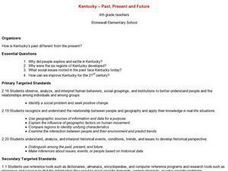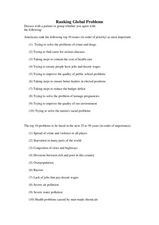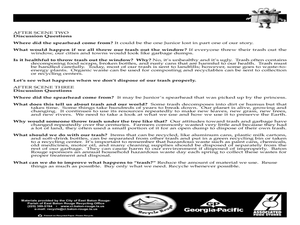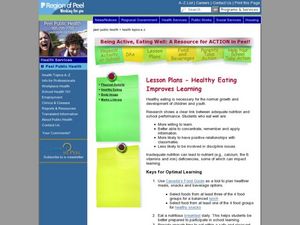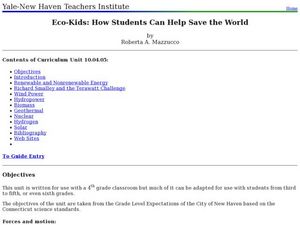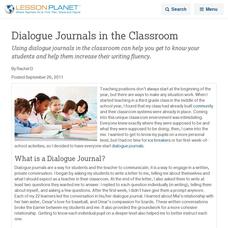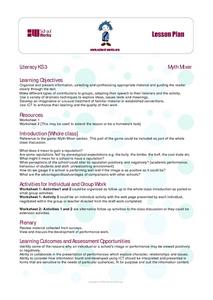Curated OER
Insects
Third graders research an insect and creates a brochure on that selected insect. Each student develops a Venn Diagram comparing similarities and differences between moths and butterflies.
Curated OER
Kentucky: Past, Present and Future
Fourth graders analyze how Kentucky's past is different from the present. They research why Kentucky was even explored and settles. What social issues face Kentucky now. Discussion lies on how Kentucky can be improved for the 21st century.
Curated OER
Selection and Variation in the Egyptian Origami Bird
Students investigate genetics and evolution of species. They simulate the breeding of birds using origami birds. In addition, using dice they introduce genetic variation into the species.
Curated OER
The Hudson's Ups and Downs
Fifth graders practice interpreting line graphs of the Hudson River water levels to assess the tides and tidal cycles in the estuary. They explore how weather can affect water levels and tides and observe that high tides and low tides...
Curated OER
Patterns and Shapes in Our Community
Students explore shapes and patterns found in their own community. They identify shapes and patterns in photographs, and listen to a book about shapes. Students then examine Paul Klee paintings for shapes and patterns, and create a...
Curated OER
Colonial Customs
Young scholars experience Colonial life and explore the customs of the 17th century. In this colonial America lesson plan, students play dress up, barter items, author pledges, and review 17th century etiquette.
Curated OER
Ranking Global Problems
In this global problems instructional activity, students are given a list of ten issues that we face world wide and they rank the list in order of priority after discussing the topics with a group. Students then order the top ten...
Curated OER
A Day at the Beach: How to Keep Our Planet Clean
Students write a persuasive essay based on cleaning up the coast and other philanthropic values. For this writing lesson, students determine what is needed in order to keep the planet clean, and offer solutions to the International...
Curated OER
Healthy Water!?
Students test water for its quality and record their information.In this water quality lesson, students investigate water for pH, macro invertebrates and identify its characteristics. Students complete worksheets on their data for their...
Curated OER
Bacteria
In this bacteria learning exercise, students fill in the blanks with the correct word. Students then label the structures found on a bacterium.
Curated OER
Character Education Podcasts
Students study character traits. In this character education lesson, students create podcasts highlighting a particular character trait. Students broadcast one podcast per week.
Curated OER
Fitting Trash into Yesterday: A Fifth Grade Activity
Fifth graders explore the concept of waste management. In this recycling lesson, 5th graders discover the history of waste management and discuss how the U.S. should respond to the issue of ever-increasing waste.
Curated OER
Seedfolks
Students explore sequencing. In this sequencing lesson, students sequence events to analyze character actions as cause and effect or the plot of the story. Students discuss character actions and list them on a chart.
Curated OER
BJT Amplifier Troubleshooting
In this electrical circuit worksheet, students answer a series of 11 open-ended questions about BJT amplifiers and how to troubleshoot these circuits. This worksheet is printable and the answers are revealed online.
Curated OER
Parts of a Tree
Students identify four parts of trees. In this plant biology lesson, students read the book Trees and conduct Internet research to identify the parts of the tree. Students take notes from each website and complete an included worksheet.
Curated OER
Conditions of City Life in the Late 19th Century
Students examine tenement life. In this lesson on early urbanization, students research the role of journalism for social change in early American cities. Students write a journal article for themselves that demonstrate an understanding...
Curated OER
Models as Tools for Ecosystem Management
Fifth graders explore the concept of environmental management. For this ecosystem lesson, 5th graders discover how models help scientists learn more about managing ecosystems. Students create their own model, make observations and...
Curated OER
The Industrial Revolution
Tenth graders explore the impact of the Industrial Revolution. In this Industrialization lesson, 10th graders take notes on a SMART Board presentation and conduct research on urbanization, enclosure, assembly lines, boarding houses, and...
Curated OER
Healthy Eating Improves Learning
Students recognize that healthy food gives you better ability to concentrate and makes you more willing to learn. In this healthy food lesson, students choose food from Canada's food guide to create a healthy lunch and healthy snack.
Curated OER
Recycling Who cares?
Students participate in activities to understand the feelings of the community about recycling. In this recycling lesson, students look at opposing views on recycling.
Curated OER
Allelopathy Experiments
High schoolers explore how allelopathy works in plants. In this botany lesson, students explain how this phenomenon affect other organisms. They read and analyze an article about allelopathy and discuss its flaws.
Curated OER
Eco-Kids: How Students Can Help Save the World
Fourth graders identify the different types of renewable and nonrenewable energy sources. In this ecology instructional activity, 4th graders create models of wind mills and hydropower. They discuss the pros and cons of using alternative...
Curated OER
Dialogue Journals in the Classroom
Using dialogue journals in the classroom can help you get to know your students and help them increase their writing fluency.
Curated OER
Myth Mixer
Your class can organize and present information. Theyselect and synthesize material then guide a reader therough the text. They make different types of contributions to groups, adapting their speect to their listeners and the activity. A...



